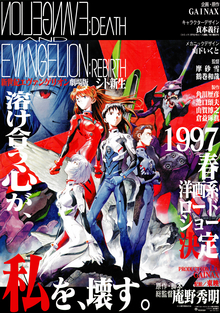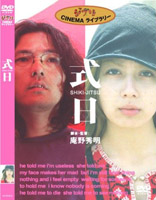 W
WCutie Honey is a 2004 Japanese tokusatsu film directed by Hideaki Anno. It is an adaptation of the 1970s manga and anime series Cutie Honey.
 W
WThe End of Evangelion is a 1997 Japanese animated science fiction psychological drama film written and co-directed by Hideaki Anno and animated by Gainax and Production I.G. The film serves as a parallel ending to the anime television series Neon Genesis Evangelion, aired until 1996, which ended with two episodes that became a source of controversy. Shortly before its release, Hideaki Anno and the Gainax studio produced a feature film called Neon Genesis Evangelion: Death & Rebirth, consisting of a summary of the first twenty-four episodes of the series and a short preview of the work. Like Death & Rebirth, The End of Evangelion was conceived by the creators to be divided into two parts, called "Episode 25': Love Is Destructive" and "Episode 26': I Need You," remakes of the last two episodes of the original television series. In 1998 the two feature films, partially overlapping, were linked by eliminating the part in common and reissued under the name of Revival of Evangelion.
 W
WEvangelion: 1.0 You Are (Not) Alone. is a 2007 Japanese animated science fiction action film, written and chiefly directed by Hideaki Anno. It is the first installment of the Rebuild of Evangelion tetralogy, based on the anime television series Neon Genesis Evangelion. The story, which is set in the futuristic city of Tokyo-3 fifteen years after a planetary catastrophe known as the Second Impact, focuses on Shinji Ikari, a boy who is recruited by the special agency Nerv to pilot a giant mecha known as an Eva unit and fight, along with fellow pilot Rei Ayanami, against mysterious beings named Angels. The film features the same cast of voice actors from the original series, including Megumi Ogata as Shinji Ikari, Megumi Hayashibara as Rei Ayanami, and Kotono Mitsuishi as Misato Katsuragi.
 W
WEvangelion: 2.0 You Can (Not) Advance. is a 2009 Japanese animated science fiction action film directed by Kazuya Tsurumaki and Masayuki, and written by Hideaki Anno. It is the second of tetralogy of films released in the Rebuild of Evangelion. The tetralogy is based on the original anime series Neon Genesis Evangelion. It was produced and co-distributed by Hideaki Anno's Studio Khara in partnership with Gainax.
 W
WEvangelion: 3.0 You Can (Not) Redo. is a 2012 Japanese animated science fiction action film written and chief directed by Hideaki Anno and the third of four films released in the Rebuild of Evangelion series, based on the original anime series Neon Genesis Evangelion. It was produced and co-distributed by Anno's Studio Khara and released in Japanese theaters on November 17, 2012. It was followed by Evangelion: 3.0+1.0 Thrice Upon a Time in 2021.
 W
WEvangelion: 3.0+1.0 Thrice Upon a Time is a 2021 Japanese animated science fiction film written and directed by Hideaki Anno and produced by Studio Khara. It is the fourth and final film in the Rebuild of Evangelion film series, part of the Neon Genesis Evangelion franchise.
 W
WLove & Pop is a 1998 Japanese experimental film directed by Hideaki Anno, based on the novel Topaz II by Ryū Murakami. It was Anno's first live action feature-length film. The film was shot almost entirely on hand-held digital cameras and contains some very unusual camera work, including many different mounted camera positions, such as on a model train riding on tracks. The film also flips from widescreen to fullscreen, distorts, confuses, and makes use of overlays stacked in layers to convey the character's emotions.
 W
WNeon Genesis Evangelion: Death & Rebirth , also romanized in Japan as Evangelion:Death and Evangelion:Rebirth, is a 1997 Japanese animated psychological science fiction film. It is the first installment of the Neon Genesis Evangelion feature film project and consists of two parts. The project, whose over-arching title translates literally to New Century Gospel: The Movie, was released in response to the success of the TV series and a strong demand by fans for an alternate ending. Its components have since been re-edited and re-released several times.
 W
WShiki-Jitsu is a 2000 art film written and directed by Hideaki Anno. The film is Anno's second live-action feature. The screenplay is an adaption of Ayako Fujitani's novella Tōhimu, which was inspired by an emotionally difficult time in Los Angeles working on her father Steven Seagal's 1998 film The Patriot.
 W
WShin Godzilla is a 2016 Japanese kaiju film directed by Hideaki Anno and Shinji Higuchi, with a screenplay by Anno and special effects by Higuchi. Produced by Toho Pictures and Cine Bazar and distributed by Toho, it is the 31st installment in the Godzilla franchise, the 29th Godzilla film produced by Toho, Toho's third reboot of the franchise, and the first film in the franchise's Reiwa period. The film stars Hiroki Hasegawa, Yutaka Takenouchi, and Satomi Ishihara. In the film, politicians struggle with bureaucratic red tape in order to deal with the sudden appearance of a giant monster that evolves whenever it is attacked.
 W
WShin Kamen Rider is an upcoming Japanese tokusatsu film written and directed by Hideaki Anno, produced to celebrate the 50th anniversary of the Kamen Rider Series and is a reboot of the original 1971 Kamen Rider series. It is the third of Anno's reboots of tokusatsu franchises, following 2016's Shin Godzilla and the upcoming Shin Ultraman. The film is scheduled for release in March 2023.